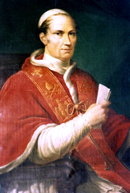Papal conclave, 1823

Coat of arms during the vacancy of the Holy See
|
|
| Dates and location | |
|---|---|
| 2–28 September 1823 Quirinal Palace, Papal States |
|
| Key officials | |
| Dean | Giulio Maria della Somaglia |
| Sub-Dean | Bartolomeo Pacca |
| Camerlengo | Bartolomeo Pacca |
| Protopriest | Giuseppe Firrao |
| Protodeacon | Fabrizio Ruffo Dionigi |
| Election | |
| Vetoed | Antonio Gabriele Severoli |
| Elected Pope | |
|
Annibale della Genga (Name taken: Leo XII) |
|
 |
|
Following the death of Pope Pius VII on 20 August 1823, a papal conclave was held to determine his successor. The conclave began on 2 September and ended 26 days later with the election of Cardinal Annibale della Genga who became Pope Leo XII.
Pius VII had reigned as Pope for what was then considered a very long pontificate (he was elected in 1800). During his reign as Pope, the Catholic Church had faced, in the French Revolution and its aftermath, the most severe attack on its power and legitimacy since at least the Reformation – some might say since Theodosius made Christianity the state religion of the Roman Empire.
During Pius VII's papacy, the cardinals had tended to divide into two groups, the zelanti and the politicani. The zelanti were more radically reactionary than the politicani and wanted a highly centralised Church and vehement opposition to the secularising reforms that had resulted in France from the Revolution spreading to the Papal States. The politicani, though anti-liberal, were much more moderate and favoured a conciliatory approach to dealing with the problems new ideologies and the incipient Industrial Revolution were creating. The leader of this faction was Pius VII's Cardinal Secretary of State, Ercole Consalvi, but the zelanti wanted a much less moderate pontiff and they set fervently to this task from the time of Pius VII's death.
The length of Pius VII's papacy had a significant influence because of the forty-nine electors who participated in the conclave, only Giulio Maria della Somaglia and Fabrizio Dionigio Ruffo were already cardinals when Pius VII was elected in 1800. Thus, forty-seven of the forty-nine electors had had no practical experience electing a Pope before this conclave.
...
Wikipedia
